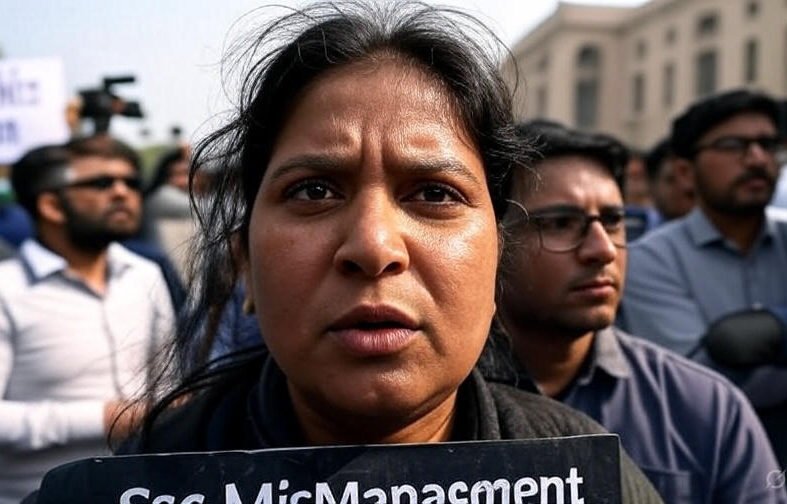In the summer of 2025, the Staff Selection Commission (SSC) exams, particularly the Selection Post Phase 13 exams conducted between July 24 and August 1, have plunged into chaos, sparking widespread outrage across India. With lakhs of aspirants vying for government jobs, the reported mismanagement has not only disrupted lives but also eroded trust in one of the country’s most critical recruitment processes. This article delves into the core issues, the resulting protests, and the urgent need for reform.
A Cascade of Failures
The SSC exams, a gateway to coveted government positions, have been marred by a series of unprecedented failures this year. Candidates faced abrupt exam cancellations at multiple centers, often without prior notice or clear rescheduling plans. Many traveled hundreds of kilometers, only to be turned away. For instance, some aspirants from North India were inexplicably assigned exam centers in far-flung regions like the Andaman and Nicobar Islands, adding financial and logistical burdens.
Technical glitches further compounded the chaos. Reports flooded in of server crashes, unresponsive systems, and malfunctioning biometric verification, rendering exams unfeasible for thousands. At some centers, candidates encountered bizarre conditions, such as cattle roaming near testing facilities, highlighting a shocking lack of oversight. Security lapses also led to cancellations at two centers, though the SSC claimed these were re-conducted on the same day.
The Vendor Controversy
At the heart of the controversy lies Eduquity Career Technologies, the agency tasked with conducting the exams. Critics, including educators and candidates, have questioned the SSC’s decision to outsource to a vendor with an allegedly questionable track record. While SSC Chairman S Gopalakrishnan denied claims that Eduquity was blacklisted, the firm’s handling of the exams has drawn sharp criticism. From inadequate infrastructure to poor communication, the vendor’s shortcomings have fueled demands for its removal and a high-level inquiry into the SSC’s vendor selection process.
Protests and Public Outcry
The mismanagement has ignited nationwide protests, with thousands of aspirants and educators rallying under the “Delhi Chalo” banner. Demonstrations at Jantar Mantar and the CGO Complex in Delhi turned tense, with reports of police using force to disperse crowds. On platforms like X, the hashtag #SSCMisManagement trended, amplifying stories of candidates’ struggles, from financial losses to emotional distress. Videos showing dilapidated exam centers and alleged mistreatment, such as security personnel manhandling candidates, have gone viral, intensifying public anger.
Aspirants are demanding accountability, including compensation for travel expenses, better exam center allocation, and robust infrastructure to prevent future disruptions. Many are also calling for transparency in the SSC’s operations and a complete overhaul of the exam process.
SSC’s Response: Too Little, Too Late?
In response, SSC Chairman S Gopalakrishnan acknowledged “initial hiccups” with the new vendor, citing issues like computer system failures and distant center allocations. He assured candidates that re-tests would be conducted for those affected and promised improvements within a month. The SSC extended the Phase 13 exam to August 2, but turnout was dismal, with only 8,048 of 16,600 registered candidates appearing. The commission is now analyzing CCTV footage and electronic data to address complaints and has committed to refunding the Rs. 100 answer key challenge fee.
However, these measures have done little to quell the unrest. With the SSC Combined Graduate Level (CGL) Tier 1 exams, involving nearly 30 lakh candidates, scheduled for August 13–30, 2025, fears of further mismanagement loom large. The SSC’s assurances of a smoother process have been met with skepticism, given the scale of the Phase 13 debacle.
A Systemic Crisis
The 2025 SSC exam fiasco is not an isolated incident but a symptom of deeper systemic flaws in India’s competitive exam framework. With around 5 lakh candidates registered for Phase 13 alone and over 55,000 complaints lodged, the scale of the issue is staggering. The reliance on private vendors, inadequate infrastructure, and lack of clear communication have eroded confidence in the SSC, an institution that millions depend on for their future.
This crisis also underscores the immense pressure on India’s youth, who invest years preparing for these high-stakes exams. The financial and emotional toll of cancellations, coupled with the uncertainty of rescheduling, has left many disillusioned. As one protester poignantly stated on X, “We’re not just fighting for exams; we’re fighting for fairness.”
The Path Forward
The SSC must act swiftly to restore trust. Key steps include:
- Transparent Vendor Selection: A thorough review of vendor contracts and performance to ensure accountability.
- Localized Exam Centers: Allocating centers closer to candidates’ residences to reduce travel burdens.
- Robust Infrastructure: Investing in reliable technology and facilities to prevent technical failures.
- Clear Communication: Timely updates on cancellations, rescheduling, and results to avoid confusion.
- Compensation: Reimbursing candidates for expenses incurred due to mismanagement.
As protests continue, with a silent demonstration planned at Jantar Mantar on August 6, 2025, the government and SSC face mounting pressure to deliver justice. The stakes are high, not just for the affected candidates but for the credibility of India’s public recruitment system.











Leave A Reply